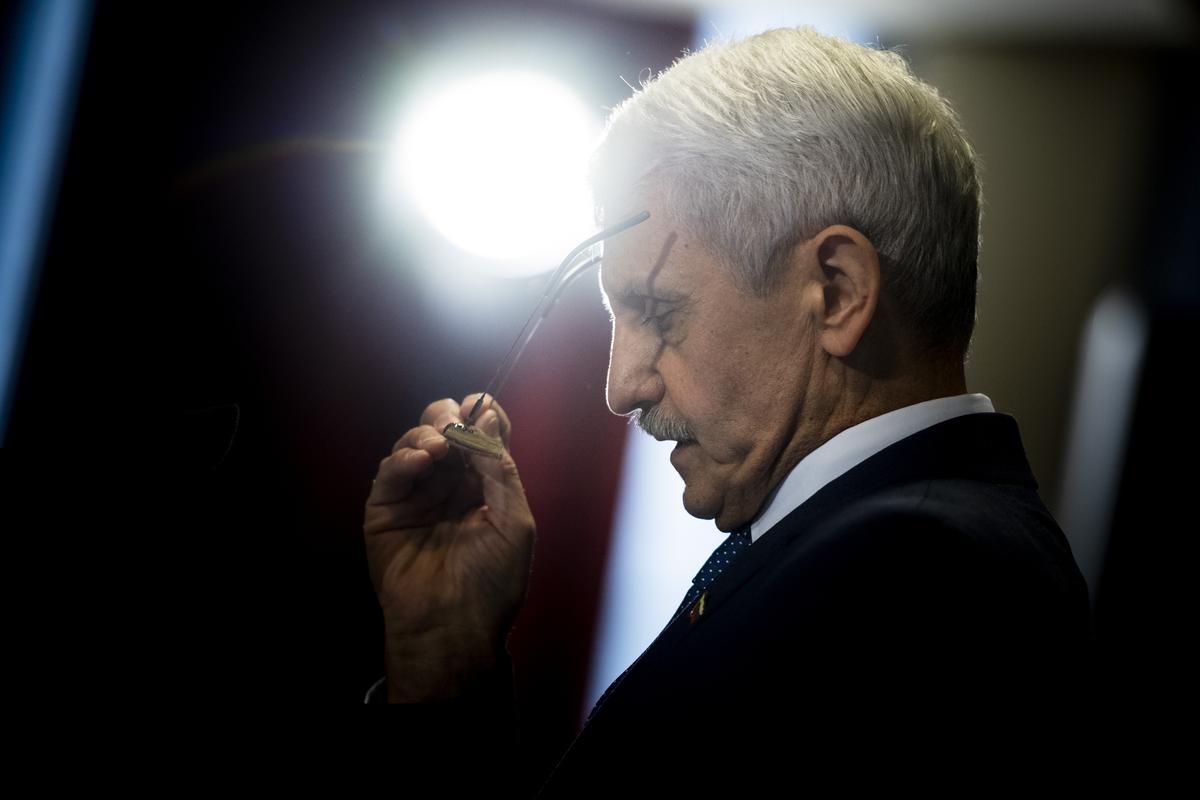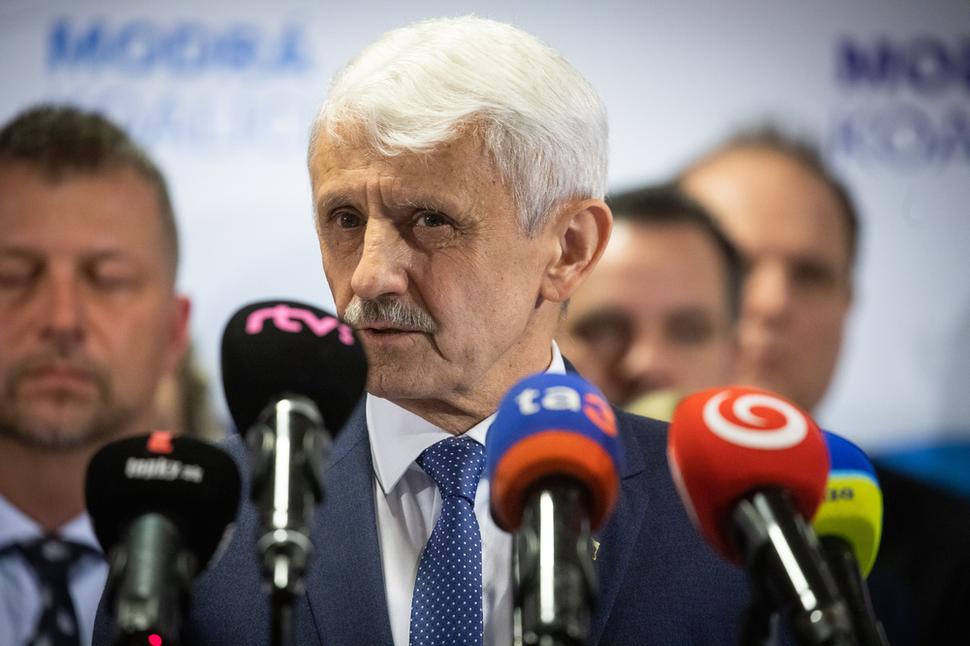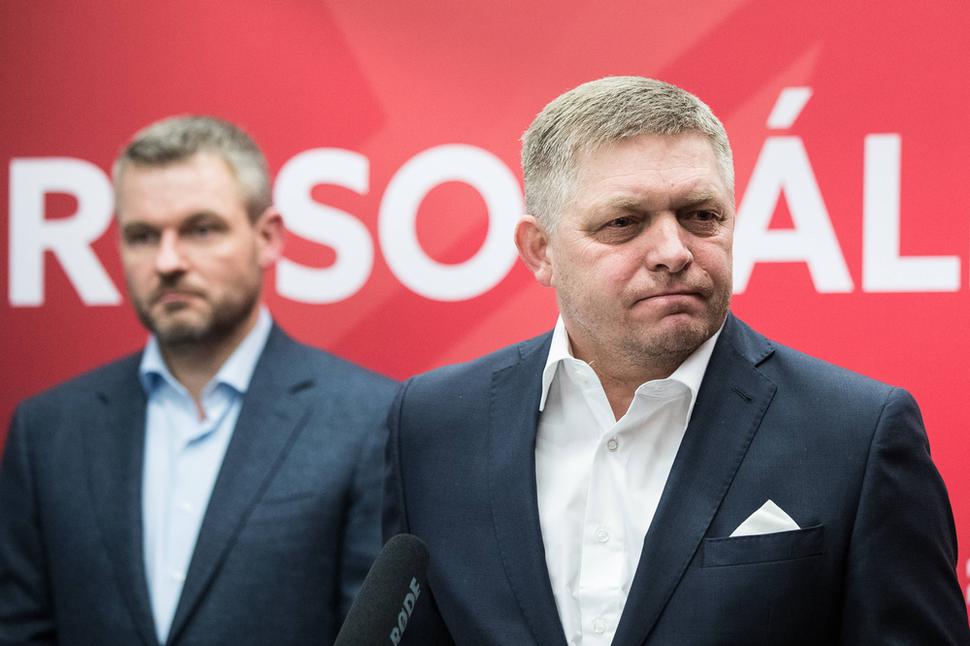A quarter of a century after he became the man who buried the semi-authoritarian regime of Vladimír Mečiar, the former Slovakian prime minister, Mikuláš Dzurinda, has announced a new party. Claiming he feels the imperative and responsibility to be of service to his country once again, Dzurinda hopes to pull off another historic win in this year's early election like he did back in 1998, when he rescued democracy from the clutches of Mečiar.
“It’s apathy that rules in the country today,” the former two-time Slovak prime minister maintained in an interview with the conservative daily Postoj on the day when he announced his long-considered comeback on January 27. “We need people to raise their heads up, not keep them down.”
On top of the highest inflation recorded in 30 years, Slovaks last year had to put up with constant political conflicts within the previous ruling coalition, which led to the collapse of Eduard Heger’s government after it lost a vote of no-confidence several days before Christmas.
43 days later, Dzurinda appeared in front of the press, standing at a lectern beside a TV screen showing a presentation on the Blue Coalition – a new political formation that came out of the recent merging of his team and MP Miroslav Kollár’s small non-parliamentary SPOLU party, which has had negligible support in the polls.
“Slovakia needs new energy,” asserted the now 68-year-old chair of the Wilfried Martens Centre for European Studies in Brussels, the official think-tank of the European People’s Party.
The announcement came less than a week before a parliamentary vote set September 30 as the date for an early election and gave Heger’s interim cabinet restricted powers to govern until November. Though she indicated a preference for an earlier date for the election, President Zuzana Čaputová said she would not appoint a caretaker government unless the interim cabinet, which is under her supervision, gives her a reason to do so.
Experts say the later election date will benefit new and smaller parties, giving them more time to make themselves known to the public and form electoral coalitions. Case in point: Dzurinda is hoping to form a bloc of democratic parties in an effort to prevent as many people’s votes as possible from being unrepresented in parliament – though an unsuccessful coalition could bring about the opposite effect – and to pre-empt populists and extremists from taking power or even winning a constitutional majority of at least 90 seats in the 150-seat house.
“Slovakia and its turn for the better must come first,” Dzurinda said at the press conference, even as he was deflecting journalists’ questions about the new party or his own political ambitions.
Nostalgia for the Dzurinda era lasting from 1998 to 2006, when the ex-prime minister transformed Slovakia from Mečiar’s “black hole of Europe” into Europe’s “economic tiger”, as well as voters’ frustration with current centre-right parties could indeed work to the Blue Coalition’s advantage. However, so far, observers and the party’s potential partners have not taken the bait.
Ambition to stop chaos and populism
Though Dzurinda has spoken a lot about tackling people’s everyday problems, he has revealed next to nothing about his manifesto. It isn’t yet finished, he confessed.
In its stead, the Blue Coalition has published its “10 Blue Commandments”, which define the party’s values and basic principles, such as the promise to remain pro-European, support innovation and reforms, and stay out of matters like religion or sexual orientation.
In an interview with the Denník N daily, Dzurinda, a Christian democrat, failed to say whether he would back legislation that would finally grant rights to LGBT+ people in Slovakia. He said he would need to see any bill first. “What can I do? This is how I feel about the issue,” he said.
The Blue Coalition, whose name refers to the 1998 anti-Mečiar democratic coalition of three parties that soon expanded to five parties and changed its name to the Rainbow Coalition then to the Slovak Democratic Coalition (SDK), aims to be a version of the European People’s Party and has the same ambitions that he first brought up around 2000.
“Liberals cannot defeat conservatives; conservatives cannot defeat liberals,” claimed Dzurinda.
He does not hide his intention to create an even bigger coalition this time, an ‘SDK 2.0’. However, the situation today is quite different from 1998 when politicians of all stripes realised that Mečiar had to be removed from power. Though Mečiar’s party, Movement for a Democratic Slovakia (HZDS), actually won the early election, it was the SDK electoral party, led by Dzurinda, that formed the government following the highest parliamentary election turnout, 84 per cent, in the country’s history.
Currently, though, joining forces is not high among the priorities of the main democratic political parties, even though the populist and far-right parties could end up winning most seats in parliament at the next election, an AKO poll from January shows. For example, Hlas and Smer, self-declared social democratic and rival parties, have long dominated the polls.
Under previous Smer governments, led by ex-prime minister Robert Fico, the scale of organised crime and corruption that thrived is illustrated by the sheer number of high-level people charged and convicted in recent corruption cases.
Political analyst Marián Leško warns that the political camp of which Smer will be a member of in the election could end up winning a constitutional majority.
“We’re not playing to win the elections, we’re playing not to lose them and to prevent Smer from gaining a constitutional majority,” Leško said, stressing that Slovakia could become something in between Poland and Hungary if the Smer camp wins a majority and begins to adopt legislation that isn’t in line with democratic principles.
In an interview with the Hír TV channel last September, Fico praised Hungary’s pro-Kremlin prime minister, Viktor Orbán, for his attitude towards the war in Ukraine and criticised the EU’s alleged double standards when it comes to the protection of the rule of law.
The Hlas party of Peter Pellegrini, another former prime minister, has not ruled out cooperating with Smer, nor even the far-right Republika party.
Similarly, Dzurinda has not openly excluded Smer or Hlas from any post-election cooperation if the Blue Coalition makes it into parliament. Yet, the former prime minister has named three factors – a pro-Western orientation, protection of democracy and the rule of law, and building a sustainable and competitive economy – that will help his Blue Coalition identify parties it regards as partners.
“Do you remember any of his [Fico’s] reforms? That he would manage the state budget responsibly?” Dzurinda asked rhetorically at his press conference.
In 2006, however, Dzurinda was willing to form a coalition government with Mečiar’s HZDS. In the end, Mečiar took up Fico’s offer and joined his coalition government, which the nationalist Slovak National Party was also a member of.
Why Dzurinda cannot be leader
Despite Dzurinda’s past achievements – Slovakia joining NATO and the EU in 2004, in particular – politicians and observers do not regard him as fit to be a leader today given the number of scandals that occurred during his governments, which he has neither explained nor apologised for.
Dzurinda has never given up on his long-time friend and politician, Gabriel Palacka, who featured in several corruption scandals under his governments. Later, Palacka became the treasurer at SDKÚ, Dzurinda’s party founded in 2000. But it is the so-called “Gorilla” case file that reveals the full extent of political corruption at the end of Dzurinda’s second government.
“Is it my scandal? It is perhaps partly true. I was the prime minister,” he said on January 27, claiming he did not know about political corruption back then and reiterating he has never been prosecuted.
Surrounded by more than 20 largely unknown people at the press conference, who appeared half his age, Dzurinda said he no longer wants to run for a party or any other post. “But nor will I yield,” he noted.
Yet the reality is that Dzurinda remains an extremely unpopular figure for many, leaving the door open for another to take charge of the Blue Coalition. The interim prime minister, Eduard Heger, who it is alleged will leave OĽaNO this year, and his former foreign minister Ivan Korčok have been mentioned as potential candidates. Neither has communicated their plans to the media yet, though.
“Unless we know who, apart from Dzurinda and Kollár, will be the face of the Blue Coalition, we can only speculate about its success or failure,” political analyst Radoslav Štefančík from the University of Economics in Bratislava told the Pravda daily.
Slovaks often vote for the party whose leader they like, he explained.
Observers have also highlighted how Dzurinda’s way of communicating with the press remains unreconstructed. At the press conference, he called a female journalist “too young” to remember the past, told off another journalist for his questions, then told the media to stop writing about who is against who. Yet at the same time he also said politicians’ behaviour towards journalists must undergo a sea change.
“Just as he tries to teach young people how to do politics, he also wants to teach journalists what they can and should ask,” political scientist Jozef Lenč of the Ss. Cyril and Methodius University in Trnava told the JOJ television channel, “What a person learns in their youth, they don’t forget in their old age.”
Though Dzurinda claims not to be seeking any personal political gain but just wants to help shape the young people around him, he did reveal one personal political ambition to the conservative daily Postoj: “I’d like to raise a new prime minister.”
This story was produced in partnership with Reporting Democracy, a cross-border journalism platform run by the Balkan Investigative Reporting Network.


 Mikuláš Dzurinda. (source: TASR - Jaroslav Novák)
Mikuláš Dzurinda. (source: TASR - Jaroslav Novák)
 Mikuláš Dzurinda presents his new political project called the Blue Coalition at a press conference in Bratislava on Friday, January 27, 2023. (source: SITA - Diana Cernak)
Mikuláš Dzurinda presents his new political project called the Blue Coalition at a press conference in Bratislava on Friday, January 27, 2023. (source: SITA - Diana Cernak)
 Chair of the Smer-SD party Robert Fico (R) and Peter Pellegrini (L), who at the time was deputy chair of Smer, at a press conference after parliamentary elections on 1 March 2020. (source: SME - Jozef Jakubčo)
Chair of the Smer-SD party Robert Fico (R) and Peter Pellegrini (L), who at the time was deputy chair of Smer, at a press conference after parliamentary elections on 1 March 2020. (source: SME - Jozef Jakubčo)